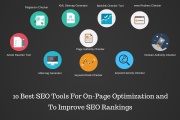How to Start a Podcast and Grow Your Audience? Ultimate Guide
Are you passionate about sharing your ideas, stories, or expertise with the world? then starting a podcast might be the perfect platform for you because, podcasts have become increasingly popular, offering a unique way to connect with audiences worldwide, but the catch is where do you begin? Don't worry we've got you covered.
In this blog post, we will guide you through the essential steps to start your podcast journey. From brainstorming your podcast concept to choosing the right equipment, recording, editing, and finally launching your show, we'll provide you with practical advice and valuable insights.
Whether you're an experienced content creator or just starting, our systematic method will guide you to turning your hobby into a profitable podcast. Get ready to captivate your audience and become a podcasting pro!

How to Start a Podcast?
Starting a podcast can be an exciting and rewarding endeavor. To get started, you'll first need to define your podcast's niche and target audience,choose the right equipment, Plan your episodes by brainstorming topics and creating a content calendar.
When it's time to record, find a quiet location and ensure good audio quality, edit your episodes to enhance sound and remove any mistakes. Finally, select a podcast hosting platform and submit your show to directories like Apple Podcasts and Spotify. Promote your podcast on social media, and engage with your audience to build a loyal following.
Podcast Concept Development
Crafting an engaging idea that speaks to your target audience is crucial to the success of your podcast. Here we'll review the fundamentals of developing a podcast idea, including finding your audience and specialty, picking the best podcast format, and deciding on a subject.
1. Identifying Niche and Target Audience:
Identifying your niche and target audience is a crucial step before starting a podcast. This process helps you define your podcast's focus, tailor your content to the right audience, and increase the chances of success.
To begin, determine your niche the specific topic or theme your podcast will revolve around. Choose something you are passionate about and have expertise in, as this will make it easier to create engaging content consistently. Research existing podcasts in your niche to understand what's already out there and find your unique angle.
Next, identify your target audience. Consider who would be interested in your podcast and why. Develop a persona that represents your ideal listener, considering factors like age, gender, interests, and pain points. This will guide your content creation and marketing efforts.
Understanding your target audience helps you tailor your content to meet their needs and preferences, making your podcast more appealing and valuable to them. It also enables you to craft effective marketing strategies and reach the right people through the platforms they frequent.
By identifying your niche and target audience, you lay a strong foundation for your podcast, increasing the likelihood of attracting listeners, building a loyal community, and achieving your podcasting goals.
2. Choosing Podcast Formats and Content Themes:
After successfully identifying your niche and target audience, the next step is to carefully select the appropriate podcast format and content themes. The podcast format pertains to the overall structure and style of your episodes, while content themes encompass the specific topics and discussions you plan to cover.
Podcast Formats:
- Interview Format: Conducting interviews with experts or influencers in your niche can provide valuable insights and attract a wider audience.
- Solo Format: Hosting episodes on your own allows you to share your expertise, stories, and opinions directly with your listeners.
- Panel Format: Inviting multiple guests to discuss a particular topic can add diversity and different perspectives to your podcast.
- Narrative Format: Telling compelling stories or sharing personal experiences can captivate your audience and create an engaging listening experience.
Content Themes:
- Educational: Delivering valuable and educational content that empowers your audience by fostering skill development, expanding knowledge, and offering effective problem-solving solutions.
- Entertainment: Entertaining your listeners through humor, storytelling, or engaging discussions on pop culture, movies, or music.
- News and Current Affairs: Discussing the latest news, trends, or events in your niche to keep your audience up to date.
- Personal Development: Focusing on self-improvement, motivation, and personal growth to inspire and empower your listeners.
Necessary Equipment and Setup for Podcast
To ensure a professional and high-quality podcast production, having the appropriate equipment and a well-designed recording space is crucial. In this section, we will discover into the necessary equipment and steps for setting up an optimal recording environment for creating a successful podcast.
Selection of Recording Equipment and Software:
1. Microphone: Invest in a good quality microphone that suits your needs and budget. Popular options include dynamic microphones for recording in noisy environments or condenser microphones for capturing more detail in a controlled space.
2. Headphones: Choose closed-back headphones that provide accurate sound reproduction, allowing you to monitor your audio quality and make necessary adjustments during recording or editing.
3. Audio Interface: An audio interface connects your microphone and headphones to your computer and helps convert analog signals into digital audio data. Select an interface that offers sufficient inputs and outputs for your recording needs.
4. Recording Software: Consider the availability of both free and paid recording software options. Opt for user-friendly software with excellent audio editing capabilities that are compatible with your computer's operating system.
Steps for Setting up a Recording Space:
1. Find a Quiet Location: Select a room or area with minimal background noise and distractions. Consider using soundproofing materials to reduce echo and external noise.
2. Acoustic Sound Proofing: Improve the sound quality of your recordings by adding acoustic sound proofing. This can include foam panels, bass traps, and diffusers strategically placed to minimize reflections and enhance audio clarity.
3. Desk and Chair: Set up a comfortable workstation with a sturdy desk and an ergonomic chair. This will ensure you can sit comfortably during long recording sessions.
4. Lighting: Proper lighting is crucial for video podcasting. Use soft, diffused lighting to eliminate harsh shadows and create a visually appealing atmosphere.
5. Cable Management: Keep your recording space organized by managing cables and wires. Use cable clips or ties to prevent tripping hazards and maintain a neat appearance.
To create a professional-sounding podcast, pay attention to detail and set up a well-equipped recording space. Choose the appropriate recording equipment, software, and create a suitable environment to produce engaging and captivating podcasts of high quality.
Crafting Compelling Content for Podcast Episodes, Effective Storytelling, and Engaging Strategies
To attract and retain listeners for your podcast, it is essential to create compelling content, this section will dive deep into two important aspects of crafting such content: developing episode outlines and implementing effective storytelling and engagement strategies.
Creating an Outline for Episodes:
- Begin by establishing a concise objective for every episode, and consider the message you aim to communicate to your audience.
- Develop a logical structure for your episode, including an introduction, main points, and a conclusion.
- Use bullet points or subheadings to organize your thoughts and ensure a smooth flow of content.
- Incorporate segment breaks or transitions to maintain listener engagement.
- Consider including a call to action, such as encouraging listeners to subscribe, leave a review, or participate in a discussion.
Effective Storytelling and Engaging Strategies:
- Begin each episode with a captivating hook or introduction to grab your listeners' attention.
- Use storytelling techniques such as anecdotes, personal experiences, or case studies to make your content relatable and engaging.
- Incorporate humor, suspense, or emotional elements to create a dynamic listening experience.
- Include listener questions, feedback, or interviews to add variety and interaction.
- Use conversational language and a friendly tone to establish a connection with your audience.
- Crafting compelling podcast content involves creating a well-structured outline and using effective storytelling and engagement strategies. This captivates listeners, fosters loyalty, and keeps them coming back for more.
- Recording and Editing Process of Podcast
- Producing a professional and polished podcast relies heavily on the recording and editing process. In this section, we will cover essential points such as recording techniques, best practices, and an introduction to editing software and basics.
Recording Techniques and Best Practices:
- Choose a quiet and controlled environment for recording to minimize background noise.
- Use a high-quality microphone and position it correctly for optimal sound capture.
- Maintain consistent microphone distance and volume levels throughout the recording.
- Consider using a pop filter to reduce plosive sounds and a shock mount to minimize vibrations.
- Take breaks and listen back to your recordings to ensure audio quality and make necessary adjustments.
Editing Software and Basics:
- Select the right editing software that works with your OS and meets your requirements.
- Become familiar with the software's basic features including importing audio files, cutting and trimming, adjusting volume levels, and adding music or sound effects.
- Learn how to remove background noise, clicks, or other unwanted sounds using noise reduction tools or effects.
- Experiment with transitions, such as fade-ins and fade-outs, to create a smooth and professional listening experience.
- Practice exporting and saving your edited files in the desired format for distribution.
- Following recording best practices and learning editing software can improve the quality and appeal of your podcast. Remember that recording and editing help you improve your content and present it professionally.
Publishing and Promotion of Podcast
After recording and editing your podcast, the next is to publish and promote it to reach your audience. In this section, we will explore two key aspects of podcasting: Podcast hosting and distribution systems, marketing strategies and audience engagement will be covered in this part.
Platforms for Hosting and Distributing Podcasts:
- Choose a reliable podcast hosting platform that offers features such as unlimited storage, RSS feed generation, and analytics.
- Popular hosting platforms include Libsyn, Anchor, and Podbean.
- Ensure your podcast is available on major podcast platforms such as Apple Podcasts, Spotify, Google Podcasts, and Stitcher to maximize your reach.
Marketing Strategies and Audience Engagement:
- Develop a marketing plan to create awareness about your podcast. Utilize social media platforms, email marketing, and your website to promote your episodes.
- Collaborate with other podcasters or influencers in your niche to tap into their audience base.
- Encourage listeners to leave reviews, subscribe, and share your podcast with their networks.
- Engage with your audience by responding to comments, conducting listener Q&A sessions, or hosting contests or giveaways.
- Consider guest appearances on other podcasts or participating in relevant industry events to expand your reach and establish yourself as an expert in your field.
- To expand your audience, promote your podcast and engage with listeners using the right platforms and marketing methods.
Monetization and Growth of Podcast
You may naturally look into revenue options to develop your podcast as it gains momentum and viewership. Your podcast's success depends on studying monetization alternatives and adopting successful techniques to develop and retain your audience. These key features can help you make money from your podcast and build a loyal audience.
Exploring Monetization Options:
- Consider advertising as a revenue stream by partnering with brands relevant to your niche. This can include pre-roll, mid-roll, or post-roll ads within your episodes.
- Seek out sponsorships from companies that align with your podcast's theme or target audience. This can involve promoting their products or services in exchange for financial support.
- Explore crowdfunding platforms like Patreon or Ko-fi, where your loyal listeners can contribute financially to your podcast in exchange for exclusive content or perks.
Strategies for Audience Growth and Retention:
- Utilize social media platforms to engage with your audience, share valuable content, and promote upcoming episodes.
- Collaborate with other podcasters or niche influencers to promote each other's shows and reach new audiences.
- Encourage listener feedback and interaction through Q&A sessions, contests, or live events.
- Analyze your podcast's analytics to identify trends, understand your audience's preferences, and tailor your content accordingly.
- Keep your audience interested and coming back for more by releasing high-quality episodes consistently, keeping to a regular schedule, and providing valuable content.
By exploring monetization options and implementing effective strategies for audience growth and retention, you can turn your passion project into a sustainable and thriving podcast. Remember, building a loyal and engaged audience is key to long-term success.
Challenges and Tips to Start a Podcast
Starting a podcast can be exciting, but it is crucial to recognize the challenges of starting a podcast. This section discusses podcasters' typical challenges and offers methods to overcome them while staying motivated and consistent. By facing these challenges, you'll be better prepared to navigate podcasting and secure your show's long-term success.
Addressing Common Challenges in Podcasting:
1. Content creation: Generating fresh and engaging content consistently can be challenging. Plan ahead, create an episode calendar, and research topics that resonate with your target audience.
2. Technical know-how: Learning the technical aspects of podcasting such as recording, editing, and uploading can be overwhelming. Investing time in understanding the basics and considering seeking tutorials or online courses is very important.
3. Growing your audience: Building an audience from scratch requires effort. Utilize social media, collaborate with other podcasters, and engage with your listeners to expand your reach.
Tips for Sustaining Motivation and Consistency:
1. Set realistic goals: Define clear objectives and break them down into smaller, achievable milestones. Celebrate your accomplishments along the way to stay motivated.
2. Establish a schedule: Consistency is key. Determine a regular release schedule and stick to it. This helps build anticipation among your audience and establishes trust.
3. Seek support: Join podcasting communities, connect with fellow podcasters, and seek advice or feedback. Always Surround yourself with like-minded individuals who can provide motivation and inspiration.
4. Stay passionate: Pick something that you're actually passionate about, being enthusiastic about what you're doing can keep you motivated and enable you to overcome any obstacles that may arise.
There will be ups and downs on the road to starting a podcast. Following these guidelines and overcoming typical obstacles, you should have no trouble becoming a successful podcaster.
Conclusion
So, beginning a podcast may be exciting and rewarding. Success is possible by choosing a topic you love, investing in quality equipment, organizing your material, promoting your podcast, and keeping motivated. Keep in touch with your audience, enhance your talents, and release consistently.
While it may take time and effort to build an audience, the satisfaction of connecting with listeners and sharing your knowledge or stories is well worth it. So, take your time, start your podcast, and enjoy the journey ahead!





